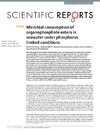Please use this identifier to cite or link to this item:
https://accedacris.ulpgc.es/jspui/handle/10553/58391
| DC Field | Value | Language |
|---|---|---|
| dc.contributor.author | Vila-Costa, Maria | en_US |
| dc.contributor.author | Sebastián Caumel, Marta | en_US |
| dc.contributor.author | Pizarro, Mariana | en_US |
| dc.contributor.author | Cerro-Galvez, Elena | en_US |
| dc.contributor.author | Lundin, Daniel | en_US |
| dc.contributor.author | Gasol, Josep M. | en_US |
| dc.contributor.author | Dachs, Jordi | en_US |
| dc.date.accessioned | 2019-12-13T11:11:46Z | - |
| dc.date.available | 2019-12-13T11:11:46Z | - |
| dc.date.issued | 2019 | en_US |
| dc.identifier.issn | 2045-2322 | en_US |
| dc.identifier.other | WoS | - |
| dc.identifier.uri | https://accedacris.ulpgc.es/handle/10553/58391 | - |
| dc.description.abstract | The anthropogenic perturbation of the phosphorus (P) marine biogeochemical cycle due to synthetic organophosphorus compounds remains unexplored. The objective of this work was to investigate the microbial degradation of organophosphate triesters (OPEs), widely used as plasticizers and flame retardants, in seawater and their effects on the physiology and composition of microbial communities. Experiments were performed in July 2014 using surface seawater from the Blanes Bay Microbial Observatory (NW Mediterranean) to which OPEs were added at environmentally relevant concentrations. The concentrations of OPEs in the dissolved-phase generally decreased after 24 hours of incubation at in situ conditions. The fitted first order reaction constants were significantly different than zero for the trihaloalkyl phosphate, tris(2-chloroethyl) phosphate and trialyl phosphate tricresyl phosphate. In general, OPEs triggered an increase of the percentage of actively respiring bacteria, total bacterial activity, and the number of low-nucleic acid bacteria, and a decrease in the percentage of membrane-compromised bacteria. Members of some bacterial groups, in particular Flavobacteria, increased their specific activity, indicating that seawater contains bacteria with the potential to degrade OPEs. In aged seawater that was presumably depleted of labile dissolved organic carbon and inorganic P, alkaline phosphatase activities significantly decreased when OPEs were added, indicating a relief on P stress, consistent with the role of OPEs as potential P sources. | en_US |
| dc.language | eng | en_US |
| dc.relation.ispartof | Scientific Reports | en_US |
| dc.source | Scientific Reports [ISSN 2045-2322], v. 9, 233 | en_US |
| dc.subject | 251001 Oceanografía biológica | en_US |
| dc.subject.other | Sp Strain Tcm1 | en_US |
| dc.subject.other | Flame Retardants | en_US |
| dc.subject.other | Tris(2-Chloroethyl) Phosphate | en_US |
| dc.subject.other | Complete Detoxification | en_US |
| dc.subject.other | Nutrient Limitation | en_US |
| dc.subject.other | Environmental Fate | en_US |
| dc.subject.other | Plasticizers | en_US |
| dc.subject.other | Bacteria | en_US |
| dc.subject.other | Bacterioplankton | en_US |
| dc.subject.other | Toxicity | en_US |
| dc.title | Microbial consumption of organophosphate esters in seawater under phosphorus limited conditions | en_US |
| dc.type | info:eu-repo/semantics/Article | en_US |
| dc.type | Article | en_US |
| dc.identifier.doi | 10.1038/s41598-018-36635-2 | |
| dc.identifier.scopus | 85060157915 | |
| dc.identifier.isi | 000456008900031 | - |
| dc.contributor.authorscopusid | 13407927200 | |
| dc.contributor.authorscopusid | 14031974200 | |
| dc.contributor.authorscopusid | 56121595500 | |
| dc.contributor.authorscopusid | 57170914300 | |
| dc.contributor.authorscopusid | 24173634500 | |
| dc.contributor.authorscopusid | 7003299234 | |
| dc.contributor.authorscopusid | 7006592184 | |
| dc.relation.volume | 9 | - |
| dc.investigacion | Ciencias | en_US |
| dc.type2 | Artículo | en_US |
| dc.contributor.daisngid | 1560591 | |
| dc.contributor.daisngid | 30892380 | |
| dc.contributor.daisngid | 6837248 | |
| dc.contributor.daisngid | 11015737 | |
| dc.contributor.daisngid | 30322068 | |
| dc.contributor.daisngid | 97985 | |
| dc.contributor.daisngid | 112143 | |
| dc.contributor.wosstandard | WOS:Vila-Costa, M | |
| dc.contributor.wosstandard | WOS:Sebastian, M | |
| dc.contributor.wosstandard | WOS:Pizarro, M | |
| dc.contributor.wosstandard | WOS:Cerro-Galvez, E | |
| dc.contributor.wosstandard | WOS:Lundin, D | |
| dc.contributor.wosstandard | WOS:Gasol, JM | |
| dc.contributor.wosstandard | WOS:Dachs, J | |
| dc.date.coverdate | Enero 2019 | |
| dc.identifier.ulpgc | Sí | es |
| dc.description.sjr | 1,341 | |
| dc.description.jcr | 3,998 | |
| dc.description.sjrq | Q1 | |
| dc.description.jcrq | Q1 | |
| dc.description.scie | SCIE | |
| item.grantfulltext | open | - |
| item.fulltext | Con texto completo | - |
| crisitem.author.fullName | Sebastián Caumel, Marta | - |
| Appears in Collections: | Artículos | |
SCOPUSTM
Citations
58
checked on Jun 8, 2025
WEB OF SCIENCETM
Citations
57
checked on Feb 15, 2026
Page view(s)
81
checked on Aug 31, 2024
Download(s)
123
checked on Aug 31, 2024
Google ScholarTM
Check
Altmetric
Share
Export metadata
Items in accedaCRIS are protected by copyright, with all rights reserved, unless otherwise indicated.
